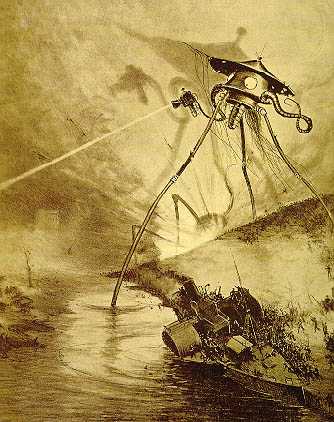By Larry Klaes
Just how we would react to the reception of a signal from an extraterrestrial civilization is an increasingly controversial question, and one filled with import as we take the SETI search in proposed new directions. The ongoing Royal Society meeting in Chicheley (UK) probes the issue, with panel discussions on whether or not we should be sending our own broadcasts to the stars, and presentations exploring the import of extraterrestrial life on the future of humanity. It seems a good time, then, for Larry Klaes to have a look at the question in this, the first of a two-part essay that analyzes our attitudes not so much about signals from the stars as their senders.
Several months ago, the famous British physicist and cosmologist Stephen Hawking shared his views on extraterrestrial intelligences (ETI) with the intelligent beings of the planet Earth. This was done in no small part as a way to gain publicity for his new television science series, Stephen Hawking’s Universe, video clips of which may be seen at the site.
The Scenario and Its Problems
Hawking thinks that if biological life evolved elsewhere in the Cosmos as it has here on Earth, then there is a good chance it will have a similar territorial and predatory nature as do most creatures on this planet. These behaviors would instinctively remain even for species that achieve sentience and technologies that exceed humanity and our civilization.

Sounding very much like the alien invaders from the 1996 science fiction film Independence Day, Hawking’s advanced ETI would roam the galaxy in massive starships that serve as both transportation and home to these beings. Having used up the resources of their home world (and presumably the rest of their solar system), Hawking’s ETI would search for suitable worlds to “conquer and colonize,” using them up as well (and subduing and/or removing any living native competition in the process) and then moving on to the next set of viable targets.
There are numerous issues with Hawking’s scenario, which even a modest student of science fiction knows goes back over a century, with the invading Martians of H. G. Wells classic work The War of the Worlds being among the most notable of the premise that alien intelligences might treat us the way most human cultures have treated others on Earth for millennia, right up to the present day. The numbers of novels, books, films, television series, and articles that have been made about this subject since Wells’ day would fill a decent size library. So why are Stephen Hawking’s views on this matter receiving so much attention from the media and public?
The most obvious reason is that Hawking is a famous and brilliant scientist, one of the few whom the general populace recognizes with ease, like Albert Einstein, even if they don’t always know or understand his work and ideas. These factors combine to make the public and media think that professionals like Hawking are therefore experts on virtually every subject in existence, including the nature and behavior of hypothetical ETI.
While few would dispute the high intelligence and knowledge levels of Hawking when it comes to his chosen career fields, the truth is that on the matter of extraterrestrial life, Hawking has no deeper insights on that subject than any other human on Earth, past or present. Hawking is still subject to his culture, era, and species when it comes to ETI. Even Einstein, who Hawking has often been compared to, followed the trends of his place and time when it came to aliens. Einstein assumed there were intelligent beings living on the planet Mars and even wrote about an optical method of communicating with the imagined Martians in 1937. This Einstein did despite the fact that even by that time most of the professional astronomers of his day seriously doubted that the Red Planet either had or could support complex, intelligent life forms.
This is not intended to be a putdown of these great thinkers. Instead this shows that when it comes to predicting the forms and motivations of ETI, after two millennia of contemplation on the subject and just a few decades of actually searching for them, all we really have to go on for solid evidence are the inhabitants of a single planet called Earth and the tantalizing clues slowly popping up across the rest of the Universe.
Overcoming Humanity’s Instinctive Drives
So why do Hawking and so many others assume a Universe full of predatory life forms, be they amoebas or beings of superior intelligence and technology? Going along the theme that even great scientists are subject to the knowledge limits of their time, culture, and profession, life on this planet has long been viewed and portrayed as one which is in a constant struggle for survival against both the environment and other creatures, including and especially one’s own species. There is of course a great deal of truth to this, as virtually every terrestrial organism spends much of their lives fighting for food, living areas, and mates, either through physical force or more stealthy manipulations.

However, in recent decades, it has been recognized that life forms across the board, especially those who exist in societies, are far more altruistic and cooperative than it may seem on the surface. Even humanity, despite its abilities to make war on a globally destructive scale and despoil entire ecosystems, is far more cooperative and conscientious of ourselves and our surroundings than we tend to give ourselves credit for. We have finally begun to recognize and act upon the fact that Earth is not some limitless playground that will tolerate our ancient instinctual needs and behaviors indefinitely. This has brought about our efforts to preserve and protect the remaining resources and biota of Earth – imperfectly, of course, but at least a global response is underway – and we have so far succeeded in avoiding a nuclear war or other similar form of drastic artificial catastrophe, something our military and political leaders once considered both survivable and winnable not so very long ago.
Image: Predatory aliens run amok. An illustration from a 1906 French edition of H.G. Wells’ War of the Worlds.
With this being the case, would future humanity extend its current instinctive drives in an uncontrolled manner into the rest of the galaxy once we begin expanding our species beyond the boundaries of its home world? Would our children become what Hawking fears about ETI?
Space: Pulling Together to Survive
While no one can guarantee absolute certainties in either direction with our limited knowledge and experiences in these areas, I will say that I think living in space and on the other worlds of our Sol system, none of which are presently survivable upon without either dwelling inside protective enclosures or being heavily modified (which could take centuries if not millennia to work for the latter case) will force our space-residing descendants to work together for their mutual existence and evolution. The very harsh nature of reality beyond Earth will not tolerate the excesses and foolishness our species has been largely able to get away with for most of its existence.
Of course it is possible that future science could create a form of humanity genetically tailored to occupy just about any corner of the Sol system, on-worlds and off, or they could abandon biology altogether and place the human mind in a mechanical form and/or create a new kind of mind-being called an Artilect.
Granted, these scenarios are not something that will happen next week to be sure, plus they have numerous hurdles to overcome even if they are possible. However, they do illuminate the point that the best kinds of beings to survive and thrive on a cosmic scale are not necessarily the type of humanity that exists on Earth now, or any other form of life suited for one world only. Add to this fact that a spacefaring society would find vast amounts of resources among the planetoids and comet which we know exist throughout the stars and perhaps a species that spends its time marauding inhabited planets makes a bit less sense, if not as enthralling for the entertainment of our species.
An Earth-Centered View
Perhaps what Hawking and others fail to completely grasp is that any alien intelligences which do emerge in our galaxy will come from a world that is not a carbon copy of Earth and may in many cases evolve on a Jovian type moon, or a Jovian type world itself, or perhaps in some other kind of environment that current science would not consider to be a place for any kind of life. There is no certainty that even the behaviors of organisms everywhere are literally universal, including the kind that devour their home worlds and then have the ability and will to pack up and do the same thing again and again across the heavens. To be even more specific, the kind of actions and goals that may work for a creature confined to its home world may not be feasible if at all beyond their domain of origin.

The fact that even someone as educated and intelligent as Stephen Hawking should view other societies in the Milky Way galaxy with fear under the presumption that all intelligences evolved in similar ways and will continue to behave in an instinctive manner even if they achieve interstellar travel shows how much of humanity still thinks and lives as if the whole of existence revolves and focuses around our one planet.
Image: This poster from the 2005 version of War of the Worlds is heavy with menace, befitting a film about alien invasion. Credit: Paramount Pictures.
Accepting the fact that the vast majority of us have remained Earthbound and will continue to do so for at least a few more generations, our species nevertheless has been intellectually aware for centuries now that we dwell on a rocky planet circling one of hundreds of billions of suns in a vast celestial island. And just as the elements which make up this world are also found throughout the Universe, it is also just as possible that biological organisms do universally behave just as Hawking predicts.
The question remains, however, whether they evolve into beings of higher intelligence who still retain certain instincts or do they eventually move away from them? Or does something completely different happen and is it unique for every species? That will be the focus in Part 2, along with a look at how events might go and why if an ETI ever did attack us and our world.
Copyright © 2010 by Larry Klaes



Ron S said on October 6, 2010 at 22:14
“Larry, I get the impression (perhaps I’m mistaken) that you believe anyone who speaks of “prudence” is implying that we should hide and contemplate our navels for a while, maybe a long while, until some future enlightenment, greater strength or whatever. I know that isn’t my position.”
No, I am aiming more at the parts of the public who really do think we shouldn’t even do SETI because it somehow might attract their attention and really do think we should and can hide from the galaxy.
I agree that anything we send into the galaxy should be done with caution because while I don’t think we are in any serious danger from a hostile ETI, I also freely admit I cannot be completely certain and as I have shown, an advanced species could take us out rather easily.
But as I have also pointed out and has been demonstrated a number of times in reality, there are people on this planet who will throw caution to the wind regardless of any warnings, or in direct spite of them. As it is human nature to break rules and boundaries, we need to prepare ourselves for a Cosmos that will one day find out about us whether we are ready or not. This includes increasing our astronomical knowledge and conducting more SETI, not less. And getting an Orion starship program up and going, hint hint.
@Ronald,
Thanks for the response. It could really suck if they were merchants of the “buyer beware” type.
@ljk:
If such evidence were found, you can bet it would be reported. You can easily avoid the ridicule by just reporting the facts, and leave the conclusions and speculation to others. You would still soon drown in speaking engagements and press coverage and never have to worry about funding again.
Yes, Eniac, but you better have REALLY strong evidence that aliens visited Earth or are conducting massive astroengineering programs in space, otherwise you will be labeled the next Eric von Daniken of the Chariots of the Gods infamy from the 1970s.
The evidence would be what it is, strong or not. As long as you refrain from spinning stories around it, in the manner of von Daniken, simply reporting it would not make you a crank. Of course, in order to be published, the evidence would have to be sufficiently real to be at least puzzling to your peers, but it would not have to be “really strong” or incontrovertible. That status is usually only reached after much further investigation.
For example, a paper describing a mountain on Mars that looks like a face, with the conclusion that it is likely a coincidence, would not make the author a crank, but it would have trouble getting published, because it does not have scientific substance (perhaps a low impact neuropsychiatric journal?). On the other hand, papers on an anomalous flux of hydrogen on Titan or methane on Mars do get published. As long as the authors do not tour the country or write a book about how they found extraterrestrial life, no harm will come of it for them.
Very interesting topic. I lean towards caution, here’s why.
A default position that aliens are here to hurt us, either by their choice, or maybe simply by their presence, only serves to protect us.
Should the ETs arrive and that defensive assumption is incorrect, then it’s relatively easy to “stand down” and welcome the visitors.
By contrast, if we have no defense and automatically assume that ETs are here to help, enlighten, etc, and that proves false… well, then we’re screwed.
Far better to have a gun and never fire it than to NOTt have one when facing dangerous predators.
Jonathan, I just want to emphasize again I have never said we should do nothing to keep humanity safe and just throw caution (and transmissions and probes) to the wind when it comes to dealing with alien life, intelligent or otherwise. I think everything we send into the galaxy needs to be examined closely by experts first before it goes out because we know so little yet.
This is one reason why I am a big supporter of the group Faces from Earth, which is hoping to make certain that every future probe which leaves the Sol system does so with information about us in the vein of the Pioneer and Voyager probes and not New Horizons with their small town time capsule approach, which partly prompted formation of FfE: http://www.faces-from-earth.net/
Human nature, however, will pretty much ensure that some people will find a way to get their messages and/or themselves out there for a variety of reasons.
See here for some real examples:
http://en.wikipedia.org/wiki/Messaging_to_Extra-Terrestrial_Intelligence
They are the ones who will bring about whatever response we get from the Cosmos and that is what we really need to be prepared for. Because the Universe is not going to worry whether our species is ready for it or not and it has probably happened many times before elsewhere.
Paul,
Very interesting!
May I translate this article to Portuguese? Could you ask Larry Klaes for authorization?
Thank you.
ROCA
No problem — am checking with Larry now, and he’ll get back to you.
Steve Pinker says that violence in human society is declining. Is this how it will go for other intelligences as they evolve? Or can we not compare ourselves to a truly alien species, even an advanced one?
The details are here:
http://www.edge.org/3rd_culture/pinker07/pinker07_index.html